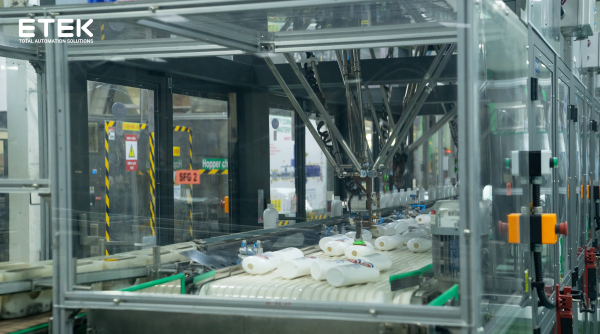The consumer goods manufacturing industry produces everyday life essentials such as detergents, etc. Currently, the development of automation in the consumer goods manufacturing industry is a trend that many businesses are interested in. Through our meetings and consultations with clients, we have noticed that customers are highly focused on and investing in the transition from semi-automation to full automation in their production plants. The goal of businesses when applying automated production is to increase productivity, enhance competitiveness against competitors, and bring the highest level of customer satisfaction.
The consumer goods industry is considered a light industry and has been established for a long time. Therefore, automation in this sector has become widespread. Moreover, thanks to technological advancements and AI intelligence, automation systems are becoming increasingly modern, solving many complex challenges.
We are an experienced provider of solutions and automation systems for major clients such as Unilever, TH True Milk, Acecook, etc. The automation systems provided by ETEK have helped clients enhance productivity and maintain control over product quality.
Some automation solutions applicable to the consumer goods industry include:
The application of automation in the consumer goods industry brings many benefits such as:
The consumer goods manufacturing industry is currently experiencing new advancements. Facing challenges such as market expansion, diversifying distribution channels, and reducing product costs, factories need to implement optimal production processes to quickly meet market demands. Therefore, the demand for automation in production is increasingly expanding.
Factories are moving towards partial automation to full automation. Applications of robots, cobots, artificial intelligence (AI), and production management software are being integrated into production lines alongside intralogistics. The closed-loop cycle will gradually be perfected, allowing for comprehensive control of the production process through modern technology.
Years
Talented Employees
The fastest company in Vietnam
Location Worldwide
ETEK confidently collaborates with clients to develop modern consumer goods production lines that meet global standards. We bring specific solutions to address each production difficulty, helping to optimize processes and enhance operational efficiency.

Fill out the form or give us a call for Consultation
Email us: info@etek.com.vn
Call us: (+84) 965 800 166